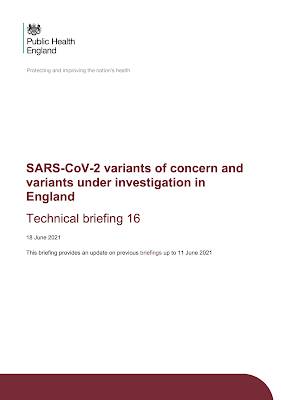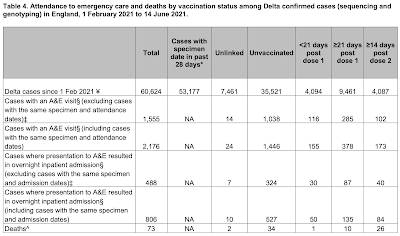In this recently published document:
…Public Health England provides us with some interesting information on COVID-19 vaccine effectiveness. Let's take a close look at the findings of the authors.
The report looks at 60,624 Delta variant infections between February 1, and June 14, 2021. Here is a table showing vaccine effectiveness against symptomatic disease for the Alpha and Delta variants combined for doses 1 and 2:
Here is a table showing vaccine effectiveness against hospitalization for the Alpha and Delta variants for doses 1 and 2:
The data would certainly appear to suggest that the COVID-19 vaccines have been quite effective (particularly after the second dose) at reducing symptoms and hospitalizations although the effectiveness of the current COVID-19 vaccines are less effective at preventing symptomatic disease related to the Delta variant than they are for the Alpha variant.
Here is the most interesting table which shows the number of delta cases which either died or required emergency care between February 1, 2021 and June 14, 2021 among unvaccinated, people who were vaccinated with one dose 21 or less days previously, one dose 21 or more days previously and those who were fully vaccinated 14 days or more previously:
A total of 35,521 Delta variant cases were among the unvaccinated compared to 4,087 cases which were fully vaccinated. That said, it is somewhat concerning that there were thousands of cases of the Delta variant despite the fact that the individuals were fully vaccinated at least two weeks prior to the test.
Let's compare the hospitalization rates for the unvaccinated versus the fully vaccinated:
Unvaccinated – 35,521 people with 527 or 1.48 percent required hospitalization
Fully Vaccinated – 4,087 people with 84 or 2.05 percent required hospitalization
Now, let's compare the death rates for the unvaccinated versus the fully vaccinated:
Unvaccinated – 35,521 people with 34 or 0.133 percent dying
Fully Vaccinated – 4,087 people with 26 or 0.636 percent dying
As you can see, when it comes to the Delta variant, while there are far more infections among the unvaccinated, those who are infected and unvaccinated are less likely to require hospitalization and nearly 5 times less likely to die than their vaccinated peers.
Now, let's look at a study from 2012 where laboratory animals were injected with experimental coronavirus vaccines after SARS emerged in China in 2002:
In this study, a variety of potential candidate coronavirus vaccines for humans with or without alum adjuvant were tested; a VLP (virus-like particle) vaccine, an NHP whole virus vaccine and an rDNA-produced S protein vaccines. The vaccines were injected into both ferrets and mice. All of the vaccines induced serum neutralizing antibodies with increasing dosages and the presence of alum, resulting in significantly increased responses.
Here are the results as quoted from the study with challenge meaning that the mice were exposed to the live SARS-CoV virus:
"Significant reductions of SARS-CoV two days after challenge was seen for all vaccines and prior live SARS-CoV. All mice exhibited histopathologic changes in lungs two days after challenge including all animals vaccinated (Balb/C and C57BL/6) or given live virus, influenza vaccine, or PBS suggesting infection occurred in all."
Here are the conclusions of the study:
"These SARS-CoV vaccines all induced antibody and protection against infection with SARS-CoV. However, challenge of mice given any of the vaccines led to occurrence of Th2-type immunopathology suggesting hypersensitivity to SARS-CoV components was induced. Caution in proceeding to application of a SARS-CoV vaccine in humans is indicated.
In other words, the animals that were injected with these experimental coronavirus vaccines developed enhanced lung disease because the vaccines induced hypersensitivity to the components of SARS-Co-V.
Since the current crop of COVID-19 vaccines is still in Phase 3 trials no matter what we are being led to believe, governments, the media and Big Pharma have no idea whether the same enhancement will occur in humans. If so, this may be at least a partial explanation for the findings in England where fully vaccinated individuals who contract the Delta variant of the COVID-19 virus have a higher hospitalization and death rate than those who are not vaccinated. If so, this is a very concerning issue, particularly given that billions of doses are now "resident" in human beings around the world.
You can publish this article on your website as long as you provide a link back to this page.






….did you control for age and previous health conditions when comparing those numbers about vaxxed VS unvaxxed mortality rates? In Feb, I imagine the vast majority of fully vaxxed people were either the elderly or the already health compromised, which would be more prone to dying from covid as such (even if fully vaccinated). I'd love to see you do the same comparison once those age and underlying health conditions taken into consideration.
Hey just curious did you control for age and underlying health conditions when comparing the above data? I imagine that most of the fully vaccinated people were fully vaccinated because they were more susceptible to the disease (ie old, immunocompromised, etc.). As such, their mortality rate would be much larger than the average population, even if they were fully vaccinated. I think it'd be better to try and control for these aforementioned characteristics before trying to pull the conclusion that the vaccine makes people more sensitive to COVID-19.